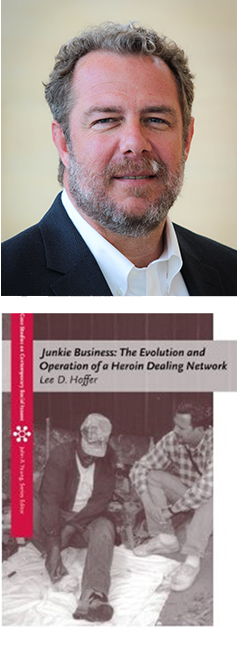Lee Hoffer
Professor, Anthropology; Director of Graduate Programs; Professor, Psychiatry, CWRU School of Medicine
Contact
lee.hoffer@case.edu
216.368.2631
Mather Memorial Building Room 217
http://caslabs.case.edu/ssca
Other Information
Degree:
Ph.D., University of Colorado, Denver, 2002
M.P.E., Washington University School of Medicine, St. Louis, 2004
About
 Dr. Hoffer is a cultural / medical anthropologist who does research on illegal drug use and substance use disorder. His work has informed a range of topics, including; HIV risk behaviors of drug injectors, understanding the misuse of medications, the diagnosis of substance use disorders, drug policy and community-based intervention studies. His research currently focuses on understanding, monitoring, and predicting trends in drug use, as well as studying how illicit drug markets, and drug acquisition, influences the lives of people who use drugs. In addition to his research endeavors, Dr. Hoffer has on-going collaborations with and provides technical support services to local community health care providers seeking to reduce the harms associated with drug use.
Dr. Hoffer is a cultural / medical anthropologist who does research on illegal drug use and substance use disorder. His work has informed a range of topics, including; HIV risk behaviors of drug injectors, understanding the misuse of medications, the diagnosis of substance use disorders, drug policy and community-based intervention studies. His research currently focuses on understanding, monitoring, and predicting trends in drug use, as well as studying how illicit drug markets, and drug acquisition, influences the lives of people who use drugs. In addition to his research endeavors, Dr. Hoffer has on-going collaborations with and provides technical support services to local community health care providers seeking to reduce the harms associated with drug use.
Social Simulation in Cultural Anthropology Research Website
“Why Social Science?” – Blog, The Consortium of Social Science Associations (COSSA)
*New* Click one of the links below to learn more about Professor Hoffer’s Study Abroad Class – International Drug Policy: Illegal Drug Policy & Harm Reduction in Zürich, Switzerland
Click and scan the QR code here for the flyer and here for the syllabus!
HIGHLIGHTS
- In 2017, Dr. Hoffer co-authored a National Academies of Sciences, Engineering, and Medicine report (funded by the FDA) entitled: Pain Management and the Opioid Epidemic: Balancing Societal and Individual Benefits and Risks of Prescription Opioid Use. This consensus committee provided the FDA with the most up-to-date data on the opioid crisis, pain management science, and made recommendations on how pain medications should be evaluated. (Read what is being said about the report here)
- Hear Dr. Hoffer being interviewed on the report findings here.
- Since 2002, Dr. Hoffer’s research has involved synthesizing 1) agent-based computational modeling techniques, 2) ethnographic research, and 3) epidemiology to offer new tools for policymakers and researchers to understand drug use and epidemics. (See link for more information)
- In 2000, Dr. Hoffer conducted an eighteen-month ethnographic case-study of a heroin dealing network in Denver, Colorado. This research is detailed in his book Junkie Business: The Evolution and Operation of a Heroin Dealing Network (Thompson-Wadsworth Press, 2006).
- Preview a Sample chapter
- Available on Amazon books
MEDIA ABOUT DR. HOFFER’S RESEARCH
Arthur Evenchik. (Fall 2012/Winter 2013). Street-Level Anthropology. art|sci magazine, College of Arts and Sciences, CWRU, vol. 9 (1).
MEDIA CITING DR. HOFFER’S RESEARCH
The Wrong Way to Fight the Opioid Crisis – The New Yorker
Report: Rethinking the “Drug Dealer” (see link on this page) – Drug Policy Alliance
How Digital Drug Users Could Help to Halt the US Opioid Epidemic – Nature
Following Heroin’s Path from Mexico to the Midwest – The Washington Post
How Mexican Drug Cartels are Fueling America’s Deadly Heroin Epidemic – The Week
How Business of Fentanyl Controls Ohio’s Opioid Crisis – The Columbus Dispatch
SAMPLE PUBLICATION
- (2016) Hoffer, Lee. The Space Between Community and Self-Interest: Conflict and the Experience of Exchange in Heroin Markets. The Economics of Ecology, Exchange, and Adaptation: Anthropological Explorations Research in Economic Anthropology. (36):167-196. ISSN: 0190-1281/doi:10.1108/S0190-128120160000036007.
RESEARCH PROJECTS
- Researching the Social Dynamics of a Local Methamphetamine Market (NIH, NIDA, R01) 2010-2016 (Abstract )
- Merging Agent-based Modeling Techniques and Ethnography: A New Analytic Tool for Studying Illicit Drug Use Behaviors, Markets and Economies (NSF) 2008-2011(Abstract)
- Evaluating the Social Structure of a Local Heroin Market (NIH, NIDA, R21) 2005-2008 (Abstract)
- A Heroin Dealing Network: Asymmetric Power and HIV Risk (NIH, NIDA, F31) 2000-2002 (Abstract)
CLASSES TAUGHT
(Fall) Economic Anthropology (Link to course description coming soon)
(Fall) Ethnographic & Qualitative Research Methods (Link to course description)
(Spring) Illegal Drugs and Society (Link to course description)
(Spring) Graduate Seminar – Ethics & Ethnography (Link to course description coming soon)
GRADUATE TRAINEES
- (2012) Schlosser, A.V. and Hoffer, L.D., The Psychotropic Self/Imaginary: Subjectivity and Psychopharmaceutical Use Among Heroin Users with Co-Occurring Mental Illness. Culture, Medicine and Psychiatry, 36(1): 26-50.
